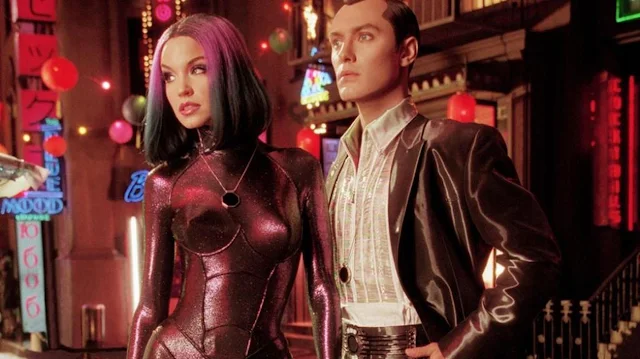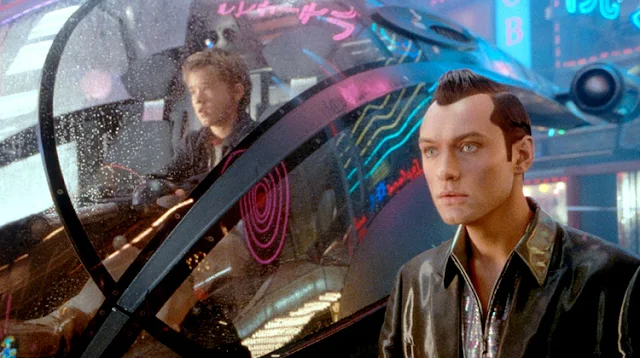Kubrick's vision for the film evolved over the years, and he embarked on extensive research and development to shape the narrative and thematic elements. He envisioned a story set in a future where advanced robots coexisted with humans, raising profound questions about the nature of identity, emotion, and the boundaries between man and machine.
Stanley Kubrick was renowned for his meticulous attention to detail and his desire to push the boundaries of filmmaking. He immersed himself in research, consulting experts in various fields to ensure accuracy and authenticity in his films. Similarly, for his AI project, Kubrick engaged in extensive discussions with scientists, philosophers, and AI researchers to inform his portrayal of future technologies and their impact on humanity.

Kubrick's unique approach to filmmaking involved a meticulous planning process. He meticulously storyboarded scenes, crafted elaborate sets, and paid close attention to lighting and cinematography to create visually stunning and intellectually stimulating films. This attention to detail and visionary mindset would lay the foundation for the AI project.
Despite Kubrick's unwavering commitment to the project, the production of the AI film faced numerous challenges. The story's complexity and philosophical themes proved to be a daunting task to translate into a cohesive screenplay. Kubrick worked on multiple drafts over the years, refining the narrative and exploring different angles to capture the essence of his vision.
Additionally, Kubrick encountered technological limitations during the production process. The visual effects required to bring the futuristic world of AI to life proved to be a significant undertaking, requiring advancements in CGI and practical effects that were not yet available at the time.
The long and intricate development process combined with these challenges led to delays and uncertainties about the project's future. Sadly, Stanley Kubrick passed away in 1999, leaving behind a potentially unfinished masterpiece.
Steven Spielberg's Involvement and Completion of AI: Artificial Intelligence
After Kubrick's passing, Spielberg felt a deep sense of responsibility to honor his friend's legacy and bring the AI project to fruition. He saw an opportunity to collaborate posthumously with Kubrick, using his own filmmaking expertise to complete the film while staying true to Kubrick's original intent.
With great reverence for Kubrick's work, Spielberg studied the extensive materials and notes left behind by Kubrick. He immersed himself in Kubrick's vision, meticulously dissecting the story, characters, and themes. Spielberg was determined to maintain the integrity of Kubrick's original concept while infusing his own directorial style into the project.
Spielberg assembled a talented team of artists, including writers and visual effects experts, to help him navigate the remaining challenges of production. With a careful blend of practical effects and cutting-edge CGI, Spielberg sought to bring Kubrick's AI world to life in a manner that would have satisfied the visionary filmmaker.

Release and reception of the completed film
In 2001, Steven Spielberg's completed version of Stanley Kubrick's AI film, titled "A.I. Artificial Intelligence," was released to the world. The film garnered significant attention and polarized opinions among both critics and audiences.While some praised Spielberg's efforts to remain faithful to Kubrick's vision, others questioned whether the film truly embodied Kubrick's distinctive style. Nevertheless, "A.I. Artificial Intelligence" stands as a testament to the collaboration of two visionary filmmakers and their shared exploration of the human condition in a world driven by artificial intelligence.
The completion of Stanley Kubrick's AI film by Steven Spielberg left a lasting impact on the film industry and fans alike. It showcased the possibilities of posthumous collaborations and demonstrated Spielberg's dedication to honoring his friend's artistic vision.
The film's release sparked renewed discussions about the ethics and implications of AI in society, provoking audiences to ponder questions about the nature of humanity and our relationship with technology. Kubrick and Spielberg's joint effort challenged conventional narratives and invited viewers to contemplate the boundaries of consciousness, identity, and empathy.
The Collaboration Begins
Steven Spielberg and Stanley Kubrick had a longstanding friendship and mutual respect for each other's work. Their collaboration on the AI film began with discussions between the two visionary filmmakers. Kubrick shared his ideas, concepts, and early developments with Spielberg, engaging him in the creative process and seeking his input.
Spielberg held Kubrick in high regard, recognizing him as a master filmmaker and an artistic visionary. Spielberg admired Kubrick's ability to tackle complex themes and push the boundaries of storytelling. Spielberg's deep appreciation for Kubrick's work fueled his desire to ensure that the AI film would maintain the essence of Kubrick's unique style and intellectual rigor.
After Kubrick's untimely passing in 1999, Spielberg faced the difficult decision of whether to take up the mantle and complete the AI film. With immense respect for his friend's legacy and artistic vision, Spielberg ultimately made the decision to carry the project forward. He understood the significance of the film to Kubrick and felt a personal responsibility to honor their friendship and collaboration.
Embracing Kubrick's Vision
As Spielberg delved deeper into the project, he made it a priority to remain faithful to Kubrick's ideas and intentions. He extensively studied Kubrick's notes, treatments, and early screenplay drafts, gaining insights into the story's themes, characters, and visual aesthetic. Spielberg aimed to ensure that the completed film would reflect Kubrick's vision as much as possible.
Kubrick left behind a treasure trove of materials related to the AI film, including detailed notes, concept art, and script drafts. Spielberg meticulously studied these materials, gaining a deeper understanding of Kubrick's storytelling approach and his intended direction for the film. This exploration served as a guiding light for Spielberg as he navigated the creative decisions required to complete the project.
While Spielberg aimed to honor Kubrick's vision, he also recognized the need to infuse his own directorial sensibilities into the film. Spielberg interpreted Kubrick's ideas and integrated them into the storytelling, adding his own emotional touch and thematic emphasis. This delicate balance allowed Spielberg to pay homage to Kubrick while creating a cohesive cinematic experience that would resonate with audiences.
By embracing Kubrick's vision and carefully integrating his own artistic sensibilities, Spielberg embarked on the challenging task of completing the AI film, resulting in a unique blend of the two directors' styles and perspectives.
Challenges and Creative Decisions
One of the significant challenges Spielberg faced was adapting to Kubrick's unconventional storytelling style. Kubrick was known for his deliberate pacing, ambiguous narratives, and thought-provoking symbolism. Spielberg had to immerse himself in Kubrick's body of work and understand his distinctive approach to storytelling in order to capture the essence of Kubrick's style and translate it into the completion of the AI film.
Kubrick often explored dark and philosophical themes in his films, and the AI project was no exception. Spielberg, known for his ability to evoke emotions and create sentimental moments, had to find a delicate balance between Kubrick's darker themes and his own sensibilities. He sought to retain the film's intellectual depth while infusing moments of empathy and human connection that Spielberg is renowned for.
The AI film presented narrative complexities and tonal shifts that required careful consideration. Kubrick's screenplay and notes contained intricate layers of symbolism and philosophical ideas. Spielberg had to navigate these complexities to ensure a coherent and engaging cinematic experience. This involved making decisions about pacing, emphasis on certain themes, and clarifying narrative elements to guide the audience through the film's intricate web of ideas.
Production and Filming Process
Spielberg assembled a talented cast and crew to bring Kubrick's AI film to life. Drawing from his own network of collaborators, he carefully selected actors who could embody the complex characters envisioned by Kubrick. The crew comprised skilled professionals who could execute the film's visual and technical requirements while understanding the creative vision of both Kubrick and Spielberg.
Both Kubrick and Spielberg were known for their pioneering use of visual effects in their films. In the production of the AI film, Spielberg aimed to strike a balance between practical effects and cutting-edge visual effects to maintain the film's aesthetic integrity. The team employed innovative techniques to bring the futuristic world and advanced AI beings to life, blending practical sets and effects with CGI advancements.
To maintain Kubrick's aesthetic, Spielberg paid careful attention to visual details, set design, and cinematography. He worked closely with the production and art design teams to create environments that aligned with Kubrick's vision. Shooting strategies, such as the use of specific lighting techniques and framing choices, were employed to evoke the distinct visual style associated with Kubrick's films.
Reception and Legacy of A.I.
"A.I. Artificial Intelligence" was released in 2001 and received mixed reviews from critics and audiences. Some praised the film's stunning visuals, thought-provoking themes, and the collaboration between Kubrick and Spielberg. Others found it to be tonally uneven or felt that it lacked the cohesion of Kubrick's previous works. The film's reception highlighted the inherent challenges of completing a project started by one visionary filmmaker and finished by another.
Kubrick and Spielberg have distinct filmmaking styles that reflect their individual sensibilities and thematic interests. Kubrick's work often delved into existential questions, moral ambiguity, and intellectual depth, while Spielberg's films frequently explore human emotions, personal journeys, and a sense of wonder. The collaboration between the two directors resulted in a fusion of these styles, with Spielberg aiming to maintain Kubrick's intellectual rigor while infusing his own emotional touch.
The collaboration between Spielberg and Kubrick had a significant impact on both directors' careers. For Spielberg, completing Kubrick's AI film allowed him to further expand his artistic range and engage with complex themes in a different context. It showcased his ability to take on challenging projects and collaborate with another visionary filmmaker. For Kubrick, the collaboration showcased the enduring legacy of his ideas and the recognition of his contribution to cinema, even after his passing.
Conclusion
The collaboration between Steven Spielberg and Stanley Kubrick on the completion of the AI film stands as a unique endeavor in the realm of cinema. It brought together two visionary filmmakers with distinct styles and thematic interests, resulting in a film that represents a blend of their creative visions.
"A.I. Artificial Intelligence" holds a unique place in both Spielberg's and Kubrick's filmographies. It serves as a testament to Kubrick's unfulfilled vision and the dedication Spielberg had to honor his friend's artistic legacy. The film's themes, visual splendor, and thought-provoking narrative contribute to the rich tapestry of both directors' bodies of work.
In conclusion, the collaboration between Stanley Kubrick and Steven Spielberg on the AI film stands as a remarkable testament to their individual brilliance and their shared passion for pushing the boundaries of cinema. While Kubrick's passing left the project unfinished, Spielberg's dedication and skill ensured that the film would see the light of day, presenting audiences with a thought-provoking exploration of AI and its impact on humanity.

















